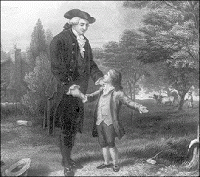An interesting article in JAMA [Sept 1, 2010] by Drs. Jain and Cassel referred to the British economist Julian Le Grand who suggested that public policy “is grounded in a conception of humans as knights, knaves or pawns.” Basically, are we motivated by virtue, by self interest or are we just passive victims? The authors suggest that this is a good question not only for physicians to contemplate but for our politicians and the general public to consider as well along with the implications of the answer.
An interesting article in JAMA [Sept 1, 2010] by Drs. Jain and Cassel referred to the British economist Julian Le Grand who suggested that public policy “is grounded in a conception of humans as knights, knaves or pawns.” Basically, are we motivated by virtue, by self interest or are we just passive victims? The authors suggest that this is a good question not only for physicians to contemplate but for our politicians and the general public to consider as well along with the implications of the answer.
Physicians need to examine whether we are working for the greater good and especially the good of our patients; and if so, then to consider why society generally does not think we are. Or do we work with our own income and other gains in mind as the foremost driver of action and work? Or perhaps do we just go about our daily efforts as unfortunate passive victims of insurer and government dictums?
Often the individual likes their physicians and thinks of him or her as a “knight.” This is the belief that the physician has the patient’s best interests in mind at all times and takes the needed steps to be sure that the patient is always placed first. But society overall does not think this way of physicians. To most, physicians have long ago lost their “Marcus Welby” status and instead are driven by the desire for a high income, reduced work load and less attention to the patient and the patient’s needs. With this sort of attitude, society through its elected officials and through the insurance apparatus erects many polices and procedures to guard against the “knave” doing harm, reaping too much income, etc.
Many physicians think of themselves today as just “pawns” in a large bureaucratic maze, unable to practice medicine as they believe it should be practiced; unable to earn a reasonable salary given the work burdens and the work content; and overwhelmed with paperwork and needless regulations. Unfortunately, society has indeed put the physician all too often in this setting and established regulations that presumably will ensure that the physician does what is needed.
There was a time in the clouded past when physicians were thought of as knights, when they looked upon themselves as members of the middle class with a special and higher calling, and government largely left them alone. But as costs of care have risen, as more safety lapses have been recognized, as quality has not been forthcoming commensurate with new knowledge, the public has come to believe that the physician is the problem and not the solution.
I would echo Jain and Cassel’s urging that physicians need to “thoughtfully consider whether and how they contribute to the perception that they are knights, knaves or pawns.” It is time to look in the mirror and, if the vision is not as desired, then to take the needed actions to make mid course corrections. To do nothing is to allow the system to characterize physicians as “knaves” and then to push them into the role of “pawns.”






